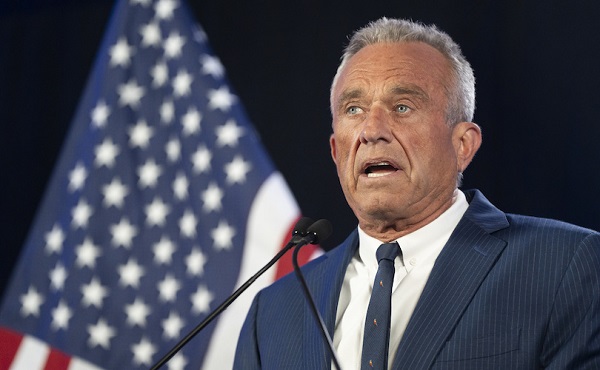Business
Trudeau government wants to give CBC more money
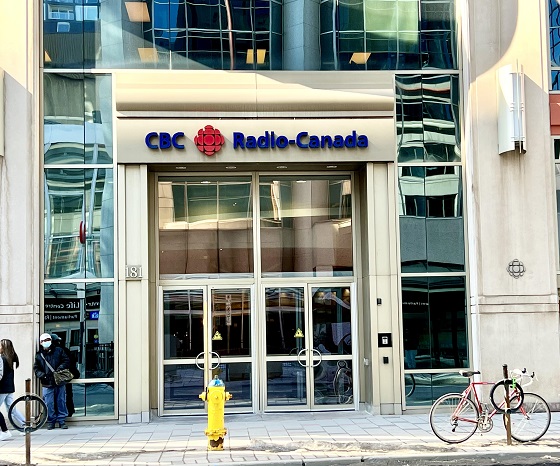
From the Canadian Taxpayers Association
By Kris Sims
The CBC used to air The Simpsons after school.
One of the best episodes was the Cape Fear homage where an FBI agent is trying to change Homer’s last name to Thompson.
After hours of explanation, the kids have fallen asleep, Marge has given up and the agent says, “When I step on your foot and say: ‘Hello Mr. Thompson,’ you nod your head! Got it?!”
Homer did not get it.
The Liberal members of Parliament on the heritage committee still don’t get it either.
The committee has sent a report to the House of Commons urging the government to give the CBC even more money.
“That the Government of Canada provide a substantial and lasting increase in the parliamentary appropriations for CBC/Radio-Canada, allowing it to eliminate its paid subscription services and gradually end its reliance on commercial advertising revenues,” reads the report.
Really? More money? The CBC already takes $1.4 billion year from taxpayers. And that’s not enough?
That amount of money could already cover the salaries of about 7,000 police officers and 7,000 paramedics.
If Trudeau’s MPs want to give the CBC more money so that it can get rid of its advertising and subscription funding, that means a huge cost for taxpayers.
According it’s latest annual report, the CBC collected about $493 million in revenue other than government funding in 2023-24, the bulk being subscription fees and advertising.
This means these Trudeau government MPs want taxpayers to fund the CBC to the tune of about $2 billion per year.
This is the opposite of what needs to happen.
The CBC should be defunded for three key reasons.
The CBC is a huge waste of money, nearly nobody is watching it and journalists should not be paid by the government.
The committee knows this.
And we know they know because the Canadian Taxpayers Federation told them to their faces in testimony before the committee.
CBC CEO Catherine Tait repeatedly testified at the committee and each time she inadvertently made a stronger case to defund the CBC, due to her entitlement and lack of accountability.
Tait refused to say if she will take a severance when she leaves the CBC next year, claiming it’s a personal matter.
It’s not personal if it’s taxpayers’ money.
Documents obtained by the Canadian Taxpayers Federation show Tait is paid between $460,000 and $551,000 this year, with a bonus of up to 28 per cent.
That’s a bonus of up to $154,448. That’s more than the average Canadian family earns in a year.
Just before Christmas last year, Tait cried broke to the committee and afterwards the CBC announced lay offs in its newsrooms.
Documents obtained by the CTF show the CBC handed out big bonuses that year anyway, costing taxpayers $18 million.
As the CBC fan group Friends of Canadian Media put it: “This decision is deeply out of touch and unbefitting of our national public broadcaster.”
It gets worse because the state broadcaster isn’t even doing a good job.
According to the CBC’s latest quarterly report, CBC News Network’s national audience share is 1.7 per cent.
Documents obtained by the CTF show the CBC’s supper hour newscast drawing microscopic audiences, with 0.7 per cent of Toronto watching the six o’clock news on CBC.
Journalists should not be paid by the government because it’s an obvious conflict of interest.
You can’t hold the powerful government to account if you’re counting on that government for your paycheque.
Such government funding of media has contributed to the rapid erosion of trust in the news media, with 61 per cent of Canadians saying they think journalists are “purposely trying to mislead people by saying things they know are false or gross exaggerations.”
CBC’s entertainment programming barely fares better. The Murdoch Mysteries, which is not produced by the CBC, pulls in its biggest audience with about 1.9 per cent of the population watching.
The politicians on the committee know all of this, and yet, like Homer Simpson, they are not getting the message.
If the CBC needs money, it should earn that money itself.
Taxpayers can’t afford the state broadcast’s bill now, let alone hundreds of millions more.
It’s time to defund the CBC.
Kris Sims is the Alberta Director for the Canadian Taxpayers Federation and a former member of the Parliamentary Press Gallery.
Business
Upcoming federal budget likely to increase—not reduce—policy uncertainty

From the Fraser Institute
By Tegan Hill and Grady Munro
The government is opening the door to cronyism, favouritism and potentially outright corruption
In the midst of budget consultations, the Carney government hopes its upcoming fall budget will provide “certainty” to investors. While Canada desperately needs to attract more investment, the government’s plan thus far may actually make Canada less attractive to investors.
Canada faces serious economic challenges. In recent years, the economy (measured on an inflation-adjusted per-person basis) has grown at its slowest rate since the Great Depression. And living standards have hardly improved over the last decade.
At the heart of this economic stagnation is a collapse in business investment, which is necessary to equip Canadian workers with the tools and technology to produce more and provide higher quality goods and services. Indeed, from 2014 to 2022, inflation-adjusted business investment (excluding residential construction) per worker in Canada declined (on average) by 2.3 per cent annually. For perspective, business investment per worker increased (on average) by 2.8 per cent annually from 2000 to 2014.
While there are many factors that contribute to this decline, uncertainty around government policy and regulation is certainly one. For example, investors surveyed in both the mining and energy sectors consistently highlight policy and regulatory uncertainty as a key factor that deters investment. And investors indicate that uncertainty on regulations is higher in Canadian provinces than in U.S. states, which can lead to future declines in economic growth and employment. Given this, the Carney government is right to try and provide greater certainty for investors.
But the upcoming federal budget will likely do the exact opposite.
According to Liberal MPs involved in the budget consultation process, the budget will expand on themes laid out in the recently-passed Building Canada Act (a.k.a. Bill C-5), while also putting new rules into place that signal where the government wants investment to be focused.
This is the wrong approach. Bill C-5 is intended to help improve regulatory certainty by speeding up the approval process for projects that cabinet deems to be in the “national interest” while also allowing cabinet to override existing laws, regulations and guidelines to facilitate such projects. In other words, the legislation gives cabinet the power to pick winners and losers based on vague criteria and priorities rather than reducing the regulatory burden for all businesses.
Put simply, the government is opening the door to cronyism, favouritism and potentially outright corruption. This won’t improve certainty; it will instead introduce further ambiguity into the system and make Canada even less attractive to investment.
In addition to the regulatory side, the budget will likely deter investment by projecting massive deficits in the coming years and adding considerably to federal debt. In fact, based on the government’s election platform, the government planned to run deficits totalling $224.8 billion over the next four years—and that’s before the government pledged tens of billions more in additional defence spending.
A growing debt burden can deter investment in two ways. First, when governments run deficits they increase demand for borrowing by competing with the private sector for resources. This can raise interest rates for the government and private sector alike, which lowers the amount of private investment into the economy. Second, a rising debt burden raises the risk that governments will need to increase taxes in the future to pay off debt or finance their growing interest payments. The threat of higher taxes, which would reduce returns on investment, can deter businesses from investing in Canada today.
Much is riding on the Carney government’s upcoming budget, which will set the tone for federal policy over the coming years. To attract greater investment and help address Canada’s economic challenges, the government should provide greater certainty for businesses. That means reining in spending, massive deficits and reducing the regulatory burden for all businesses—not more of the same.
Business
Poilievre: “Carney More Irresponsible Than Trudeau” as Housing, Jobs, and Energy Failures Mount
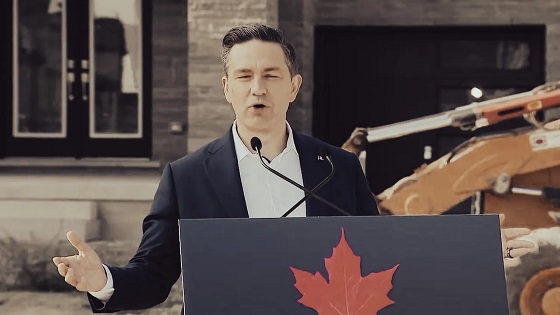
50,000 lost manufacturing jobs, 86,000 more unemployed, soaring housing costs, and blocking every LNG project while vowing to end the TFW program
Pierre Poilievre opened his press conference with a direct attack on Mark Carney and the Liberal record on housing, framing the crisis as the product of government mismanagement rather than market forces.
He began by pointing to Conservative MP Scott Aitchison, a former mayor, as an example of what can be done when local leaders “cut the taxes and the development charges and the wait times so that building can happen.” Then came the pivot: “What a contrast with Justin Trudeau — excuse me, with Mark Carney,” he said, before slamming Carney’s choice of Gregor Robertson as housing minister. Robertson, he reminded the crowd, presided over a 149% increase in Vancouver housing costs and more than doubled homebuilding taxes. Carney, Poilievre said, rewarded that record by handing him the national housing file.
The setting itself — Deco Homes, a family-run builder founded by Italian immigrants — was chosen deliberately. Poilievre praised the Gasper family for their role in building Canada’s homes and businesses, but then asked whether such families could do the same today. His answer was no. “After a decade of Liberal taxes, Liberal spending, out-of-control Liberal immigration, reckless crime policies… the Canadian promise is really broken.”
From there, he broadened the attack. He spoke of an entire generation priced out of homeownership, of immigration growing “three times faster than housing and jobs,” of crime rising, and of what he called “the worst economy in the G7.” And then he turned squarely on Carney: “Mr. Carney is actually more irresponsible than even Justin Trudeau was,” citing an 8% increase in government spending, 37% more for consultants, and 62 billion dollars in lost investment — the largest outflow in Canadian history, according to the National Bank.
The message was simple: Liberals talk, Conservatives build. Poilievre painted Carney as a man of speeches and promises, not results. “The mistake the media is making is they’re judging him by his words rather than his deeds,” he said.
It was an opening statement designed less to introduce policy — those details came later — and more to frame the battle. For Poilievre, Carney isn’t just Trudeau’s replacement. He’s Trudeau’s sequel, and in some ways worse.
During the Q and A portion of the presser; Pierre Poilievre was pressed on immigration today, and what he said was blunt. Canada, he argued, once had the “envy of the world” system: immigrants came in at numbers the country could absorb. There were jobs, housing, health care. Everyone integrated. Ten years later? He says the Liberals have destroyed that.
The facts he used were stark. According to Poilievre, Canada is bringing in people three times faster than homes and jobs are being created. He accused the government of allowing “massive abuses” of the international student program, the Temporary Foreign Worker program, and asylum claims, with what he called “rampant fraud” right under Ottawa’s nose.
He tied this directly to the economy: youth unemployment, he said, is the worst in three decades. At the same time, employers are importing more temporary foreign workers than ever, this year at a record high and using them for cheap labor under poor conditions. His line: “While our young people can’t find jobs, employers are able to exploit temporary foreign workers by giving them lower wages and terrible working conditions.”
But here’s the part that stands out politically. Poilievre said, “Immigrants are not to blame.” He put the responsibility squarely on Liberal governments, calling their immigration numbers “reckless and irresponsible.”
His fix? End the Temporary Foreign Worker program. Cut immigration levels back to “the right numbers and the right people” to fill jobs Canadians can’t do. Tighten border standards to keep criminals out. And, in his words, “always and everywhere put Canada first.”
Pierre Poilievre didn’t hold back when asked about Mark Carney’s record. His words: “Mr. Carney is actually more irresponsible than even Justin Trudeau was.” That’s not a throwaway line, he backed it with numbers.
According to Poilievre, Carney inherited what he called a “morbidly obese government” from Trudeau and made it worse: 8% bigger overall, 37% more for consultants, and 6% more bureaucracy. He says Carney’s deficit is set to be even larger than Trudeau’s.
Then the jobs number: 86,000 more unemployed people under Carney than under Trudeau. That, Poilievre argued, is the real measure, not the polished speeches Carney gives. His line: “The mistake the media is making is they’re judging him by his words rather than his deeds.”
He also went after Carney for what hasn’t happened: “He has not approved a single major national project.” Meanwhile, Poilievre says food price inflation is even worse today, crime policy hasn’t changed the same “catch and release” approach and every big promise Carney made has already been broken.
Pierre Poilievre was asked about Ukraine, and his answer wasn’t about speeches or handshakes in Brussels. It was about pipelines.
“The best way to put Canada first while helping Ukraine is to sell our oil and gas in Europe.” His argument: Vladimir Putin bankrolls his war because Europe still buys his fuel. Poilievre said if Canada had built the Energy East pipeline, we’d be shipping a million barrels of oil a day to Europe right now.
He went further: approve LNG plants immediately, liquefy tens of billions of dollars of Canadian gas, and ship it overseas to “fully displace” Russian sales. His line: “Instead of the money going to Putin’s war machine, it will go to the trades workers in this country.”
And then the indictment of the Liberals: “Mark Carney and the Liberals have blocked every single LNG project that has been put before them. As a result, we only have one plant and it was approved by Stephen Harper.”
So the contrast is stark. Carney talks about climate virtue. Poilievre says: build pipelines, sell fuel, kill Putin’s war economy, and pay Canadian workers. His closer: “That is how you put Canada first.”
Final Thoughts
So let’s just be honest. Under Mark Carney’s leadership, the numbers aren’t just bad they’re devastating. In a matter of months, Canada has lost 50,000 manufacturing jobs. These are not low-skill jobs; they are the backbone of the economy, the kind of work that built the middle class in this country. Add to that another 86,000 unemployed overall compared to when he took office. This is what Carney calls stability.
Now, if you’re a Temporary Foreign Worker, life looks pretty good. Ottawa has built an entire system around you cheap wages, little recourse, and companies happy to import you as disposable labor. If you’re a Carney insider, it looks even better. The government is 8% bigger than when Trudeau left, consultants are raking in 37% more, the bureaucracy is swelling. It’s one of the greatest insider rackets in modern Canadian politics.
But if you’re part of Canada’s middle class, if you’re a young person trying to buy a home, if you’re a worker trying to hold onto a job in a plant, a mill, or a construction site you are being hollowed out. You’re watching your wages stagnate, your housing costs explode, your jobs disappear overseas or into government-mandated “green transitions.” And when you ask for answers, what do you get? You get Patty Hajdu telling you not to be afraid of robots. You get Mark Carney telling you his deficits are “investments.” You get speeches about “climate virtue” and “AI literacy” while your livelihood collapses.
That’s the contrast Poilievre is trying to draw. On immigration, he says: let’s end the Temporary Foreign Worker scam, bring people in at a pace we can actually house and employ, and put Canadian workers first. On energy, he says: build the pipelines, approve the LNG projects, and stop funding Putin’s war by leaving Europe dependent on Russian fuel. On the economy, he says: stop measuring success by the size of government or the smoothness of a prime minister’s speeches, and start measuring it by the number of Canadians who can work, buy homes, and raise families in their own country.
So the choice is simple. Carney offers more of the same consultants, insiders, deficits, slogans, and the slow managed decline of a once-prosperous nation. Poilievre is offering something completely different: a chance to reverse the hollowing out of the middle class and to put Canadian jobs, Canadian energy, and Canadian sovereignty first.
If you’re an insider, Carney’s Canada works just fine. If you’re a middle-class Canadian, it’s a disaster. And that, in the end, is the dividing line in this country.
Subscribe to The Opposition with Dan Knight .
For the full experience, upgrade your subscription.
-

 Crime2 days ago
Crime2 days agoCharlie Kirk ASSASSINATED
-

 Crime2 days ago
Crime2 days agoConservative speaker and celebrity Charlie Kirk shot during Q & A event at Utah Valley University
-

 Alberta1 day ago
Alberta1 day agoAlberta deserves a police force that actually reflects its values
-

 Crime14 hours ago
Crime14 hours agoFormer NYPD Inspector Breaks Down How Charlie Kirk’s Shooter Will Be Caught
-

 Alberta1 day ago
Alberta1 day agoOPEC+ chooses market share over stability, and Canada will pay
-

 Crime2 days ago
Crime2 days agoAlleged Killer Of Charlie Kirk Caught
-
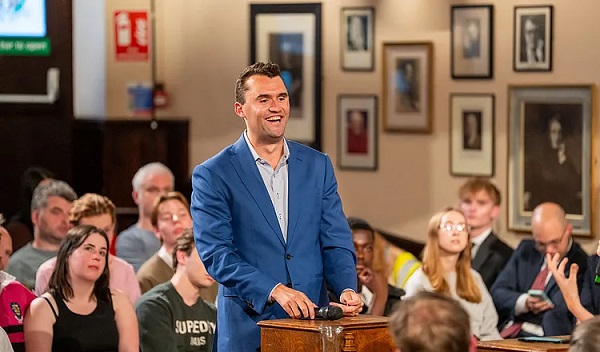
 Opinion2 days ago
Opinion2 days agoThe Charlie Kirk I Knew
-
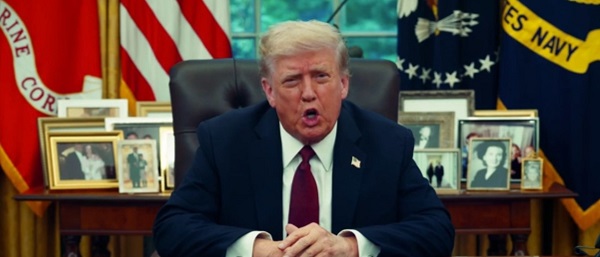
 Crime2 days ago
Crime2 days ago‘Dark Moment For America’: Trump Addresses Nation After Kirk Assassination








